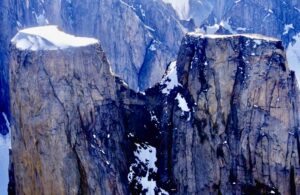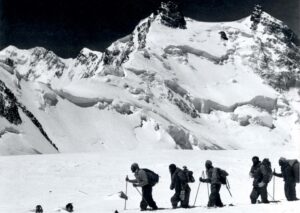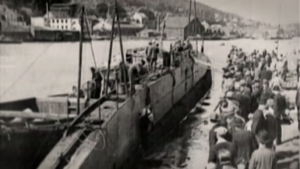The Norwegian Paul Bjorvig (1857-1935) usually isn’t considered a explorer, yet compared with some of the pre-Monty Pythonesque individuals on whose expeditions he took part, he was indeed an explorer. An explorer whose travails north of latitude 66˚ he accepted quite naturally, as if they were intrinsic part of the terrain. What follows is the best-known of those travails…
In 1898, Bjorvig signed on as an ice pilot in a North Pole expedition led by two unlikely Americans, a Chicago journalist named William Wellman and a Missouri alcoholic named Evelyn Baldwin. The expedition used Russia’s remote Franz Josef Land as a base camp to reach the Pole, but the leaders spent most of their time roaming the archipelago and giving (in the words of Wellman) “islands, straights, and points good American names.” For some reason, they thought Russian names were inappropriate for a Russian place.
While the two leaders were engaged in their roaming, Bjorvig and another Norwegian, Bernt Bentsen, remained in an ice cave named Fort McKlinley after the then-U.S. president William McKinley, and looked after the expedition’s supplies. A team of sled dogs shared the cave and sometimes used that cave, not to mention the two mens’ sleeping bags, for their lavatorial needs.

Bernt Bentsen.
This habitation was only forty miles southeast from one of the ice caves that explorer Fridtjof Nansen shared with his expedition mate Hjalmar Johansen a few years earlier. In fact, Bentsen had spent three previous years in the Siberian Arctic on Nansen’s ship the Fram, but his quarters on that celebrated polar vessel were luxurious compared to the ice cave he shared with Bjorvig.
Having become increasingly ill, probably from scurvy, Bentsen died in January of 1899. His last request to Bjorvig was: “Please don’t let a polar bear eat my remains.” Bjorvig promised to honor this request.
As it happened, the only way to keep a polar bear from eating Bentsen
was to keep his body in the ice cave. So Bjorvig wrapped Bentsen’s body in
his, Bentsen’s, sleeping bag and, because the cave was so small, he was obliged to keep the sleeping bag next to his own. He was also obliged to keep the sled dogs from regarding Bentsen’s body as cuisine.
Meanwhile, Baldwin was drinking himself into a state of stupefaction in the crude Masonic lodge he’d recently constructed. Why construct a Masonic Lodge in Franz Josef Land? Because Baldwin thought it would be popular with his American Masonic brothers who might pay a visit to these parts.
As for Wellman, he returned to Fort McKinley in the spring. Upon entering the ice cave, he asked: “Where’s Bentsen?”
“Dead,” Bjorvig replied, pointing to the sleeping bag. Then he offered Wellman a cup of coffee.
Later, he buried Bentsen’s body under a nearby pile of rocks.
When Bjorvig returned to Norway, the media paid almost no attention to him. Nowadays, of course, reporters and their ilk would be stabbing microphones in his face, asking him questions like “Did your dead bedfellow’s smell interfere with your appetite?”
If he had been asked that sort of question, Bjorvig might have replied: “The important thing was honoring my friend’s last request.”
Then he might have uttered the following words, which he subsequently wrote in his journal after describing several more of the travails bequeathed to him by cold places:
“If a man has no sorrows, he has no joys.”

Franz Josef Land, sans Masonic Lodge. Photo: Shutterstock





